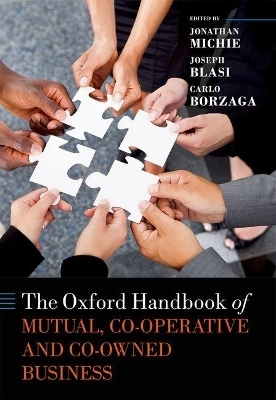
The Oxford Handbook of Mutual, Co-Operative, and Co-Owned Business
Oxford University Press (Verlag)
978-0-19-968497-7 (ISBN)
The Oxford Handbook of Mutuals and Co-Owned Business investigates all types of 'member owned' organizations, whether consumer co-operatives, agricultural and producer co-operatives, worker co-operatives, mutual building societies, friendly societies, credit unions, solidarity organizations, mutual insurance companies, or employee-owned companies. Such organizations can be owned by their consumers, the producers, or the employees - whether through single-stakeholder or multi-stakeholder ownership.
This complex set of organizations is named differently across countries: from 'mutual' in the UK, to 'solidarity cooperatives' in Latin America. In some countries, such organizations are not even officially recognized and thus lack a specific denomination. For the sake of clarity, this Handbook will refer to member-owned organizations to encompass the variety of non-investor-owned organizations, and in the national case study chapters the terms used will be those most widely employed in that country. These alternative corporate forms have emerged in a variety of economic sectors in almost all advanced economies since the time of the industrial revolution and the development of capitalism, through the subsequent creation and dominance of the limited liability company. Until recently, these organizations were generally regarded as a rather marginal component of the economy. However, over the past few years, member-owned organizations have come to be seen in some countries, at least, as potentially attractive in light of their ability to tackle various economic and social concerns, and their relative resilience during the financial and economic crises of 2007-2013.
Jonathan Michie is Professor of Innovation and Knowledge Exchange at the University of Oxford, where he is President of Kellogg College, Director of the Department for Continuing Education, and Director of the Oxford Centre for Mutual & Employee-owned Business. Jonathan is a member of Defra's Economic Advisory Panel; Council member and Chair of the Audit & Risk Management Committee for the Academy of Social Sciences. From 2004-2008 Jonathan was Director of Birmingham Business School. From 1997-2004 he held the Sainsbury Chair of Management at Birkbeck, University of London where he was Head of the School of Management & Organizational Psychology. From 1992-1997 he was at the Judge Business School in Cambridge where he was also a Fellow & Director of Studies in Economics at Robinson College. Joseph Blasi is the J. Robert Beyster Distinguished Professor at Rutgers University's School of Management and Labor Relations in New Brunswick, New Jersey and Director of the Institute for the Study of Employee Ownership and Profit Sharing at Rutgers. An economic sociologist, Blasi studies the social history of the corporation and corporate governance with a special emphasis on organizations where rewards, power, and prestige are broadly distributed, as in the case of employee share ownership and profit sharing in business. Within the Institute, he also leads a national competitive Fellowship Program that grants research fellowships and gathers over a hundred research scholars in academic conferences on these subjects. He is co-author of The Citizen's Share (Yale University Press, 2013) and a frequent policy advisor on these issues. Carlo Borzaga is full Professor of Economic policy at the University of Trento (Italy) and President of the European Research Institute on Cooperatives and Social Enterprise (Euricse). He also chairs the Master Programme in Management of Social Enterprises at the University of Trento and is a founding member of the EMES European Research network. Prof. Borzaga sits on the scientific committee of numerous Italian and European journals and is co-editor of the newly launched international Journal of Entrepreneurial and Organizational Diversity (JEOD). He has authored and co-edited numerous books and papers on labour economics and social and cooperative enterprises.
PART I: DIVERSITY AND COMPLEXITY OF MEMBER-OWNED ENTERPRISES; PART II: RATIONALE OF CO-OPERATIVE ENTERPRISES; PART III: HISTORY OF MEMBER-OWNED ORGANIZATIONS; PART IV: CO-OPERATIVES, MUTUALS, MEMBER-OWNED AND EMPLOYEE-OWNED ENTERPRISES IN THE GLOBAL ECONOMY; PART V:V. POLITICAL, GOVERNANCE, AND ORGANIZATIONAL ASPECTS; PART VI: NATIONAL CASE-STUDIES; PART VII: CORPORATE AND SECTOR CASE-STUDIES; PART VIII: THE FUTURE OF CO-OPERATIVES
| Erscheinungsdatum | 06.04.2017 |
|---|---|
| Reihe/Serie | Oxford Handbooks |
| Verlagsort | Oxford |
| Sprache | englisch |
| Maße | 186 x 253 mm |
| Gewicht | 1399 g |
| Themenwelt | Geisteswissenschaften ► Psychologie ► Arbeits- und Organisationspsychologie |
| Wirtschaft ► Betriebswirtschaft / Management ► Planung / Organisation | |
| Wirtschaft ► Betriebswirtschaft / Management ► Unternehmensführung / Management | |
| ISBN-10 | 0-19-968497-9 / 0199684979 |
| ISBN-13 | 978-0-19-968497-7 / 9780199684977 |
| Zustand | Neuware |
| Haben Sie eine Frage zum Produkt? |
aus dem Bereich


